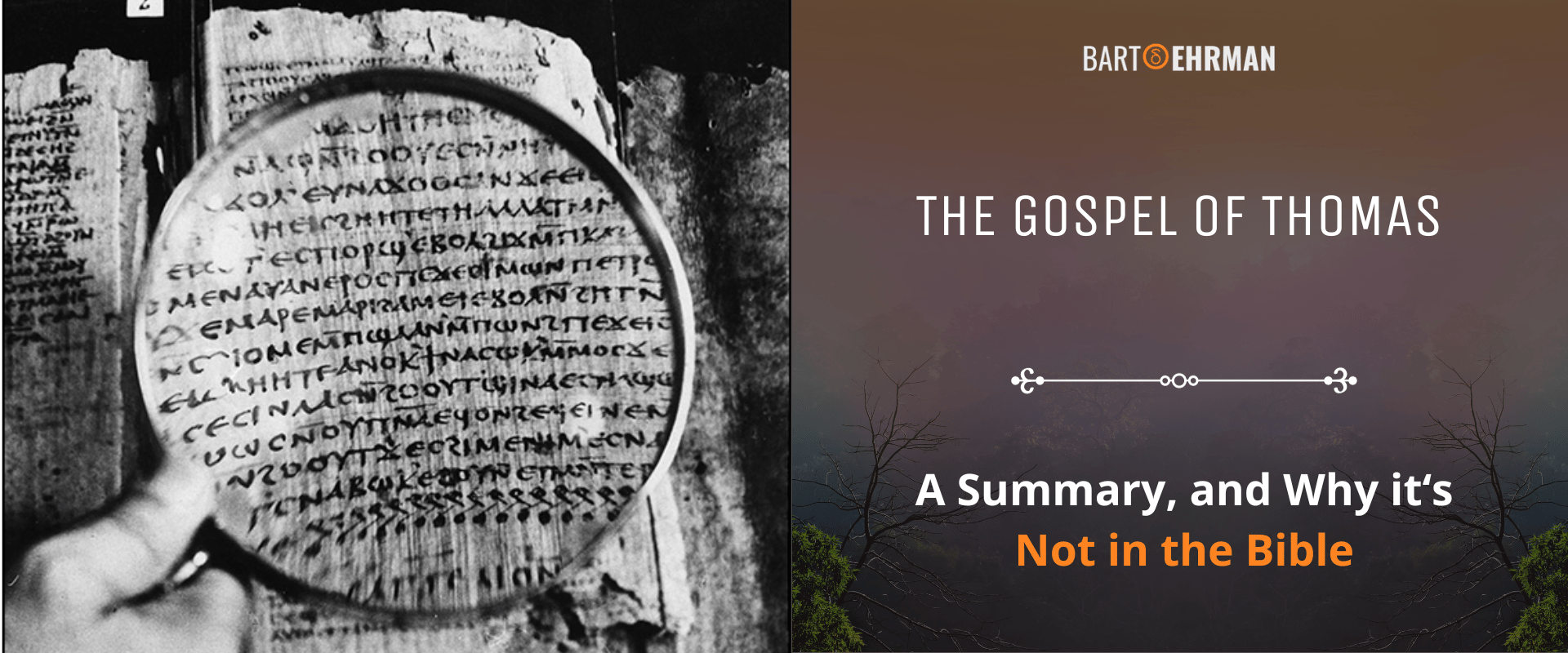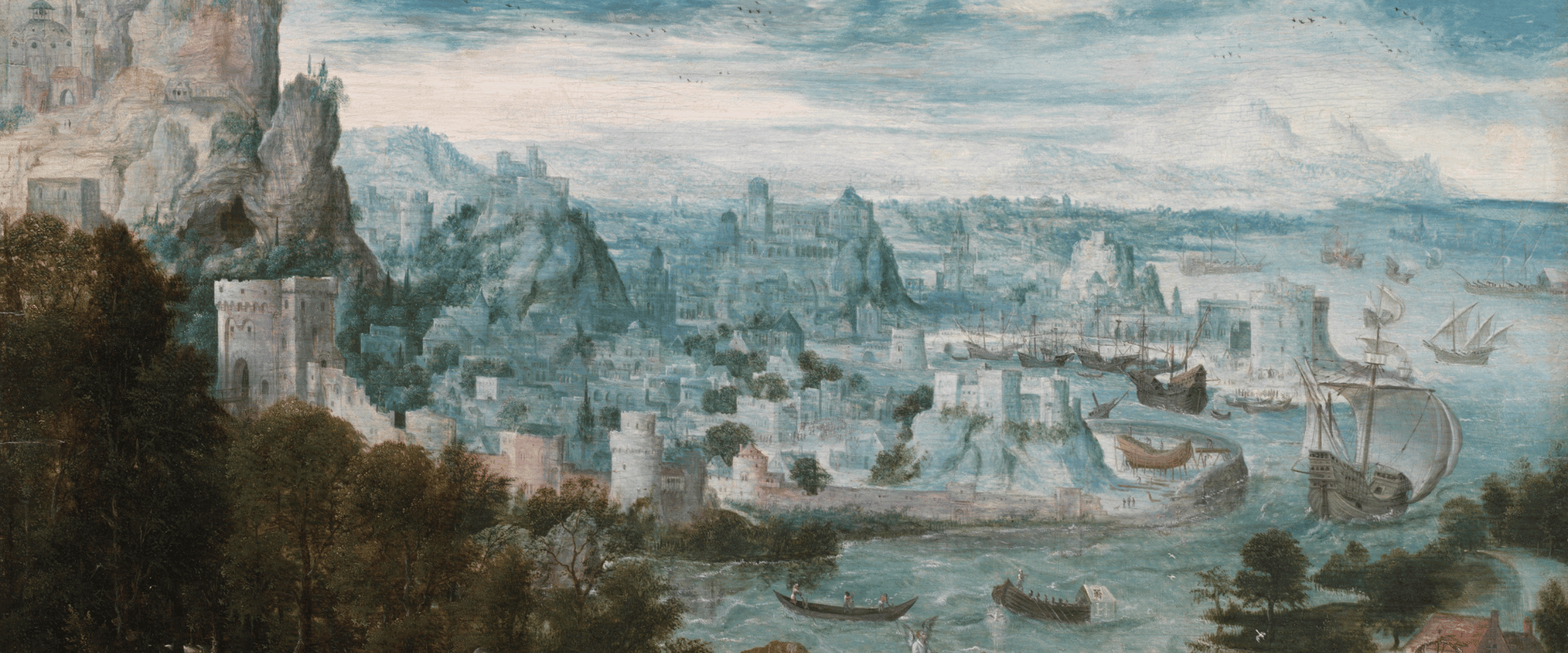The Gospel of Thomas: Summary and Why It’s Not In the Bible

Written by Marko Marina, Ph.D.
Author | Historian
Author | Historian | BE Contributor
Verified! See our guidelines
Verified! See our editorial guidelines
Date written: October 10th, 2023
Disclaimer: The views and opinions expressed in this article belong to the author and do not necessarily match my own. - Dr. Bart D. Ehrman
In the dry climate of the Egyptian desert, an ancient secret lay hidden for centuries. A secret so profound and thought-provoking that it challenges the very foundations of traditional Christianity. This secret comes as a text—an extraordinary and enigmatic one known as the Gospel of Thomas.
We will unravel the mysteries of the Gospel of St. Thomas, explore its fascinating discovery in the mid-20th century, the surviving manuscripts that have preserved its wisdom, delve into its essential message, and confront the perplexing question of whether Catholics (and other Christians) recognize the Gospel of Thomas.
I remember watching the movie Stigmata for the first time back in 2013. In it, Patricia Arquette played a hairdresser who became possessed by the spirit of a dead priest who tried to translate the lost Gospel of Thomas. This Gospel, as the movie informs us, preserves the true words of Jesus. But the Catholic Church tried to suppress it from the public eye.
I’m afraid the truth about the lost Gospel of Thomas is less dramatic and more complicated than Hollywood theories suggest.

Discovery of the Lost Gospel
The uncovering of the book of Thomas is an interesting story. Until the 20th century, no copy of this text was known to survive. The earliest known reference to this source came in an early Christian work entitled Refutation of All Heresies.
This work has often been attributed to a Roman bishop Hippolytus (c. 170-235 C.E.). However, recent scholarship has shown that this attribution is wrong. Unfortunately, we don’t know the exact identity of the author. All we know is that the work originated within Roman Christianity in the early third century
Writing about a “heretical” group of Christians called the Naassenes, the author asserts: “Concerning the Kingdom of Heaven, they transmit a direct quote from the Gospel According to Thomas: ‘The one who seeks me will find me in little children seven years old’.”
In 1945, a significant discovery happened near Nag Hammadi, Egypt, when a collection of 13 ancient Coptic books was unearthed. Among these remarkable findings was a document known as the Gospel According to Thomas. Within this text, there is a profound statement attributed to Jesus: “A person advanced in days will not hesitate to question a little child seven years old about the place of life.”
The quotation features a child of the age of 7 as the source of wisdom. In other words, it resembles the quotation we have from the Refutation of All Heresies. Most scholars, therefore, believe that the Coptic text is a translation of the original Gospel of Thomas which circulated in Greek.
Furthermore, at the beginning of the 20th century, scholars discovered three fragmentary Greek papyri of the Gospel of Thomas in the ancient Egyptian town of Oxyrhynchus.
The Gospel of Thomas and the Bible
Historians disagree over how much earlier than the year 200 C.E. Thomas was composed and whether the author used the canonical Gospels. A minority of scholars such as John D. Crossan argue that Thomas originated independently of four New Testament Gospels in the 1st century C.E.
Nonetheless, a prevailing view among scholars, exemplified by Mark Goodacre's comprehensive analysis, posits that the Gospel of Thomas likely originated in the early 2nd century. This hypothesis suggests that it was partly influenced by the Biblical Gospels, particularly the Synoptic Gospels.
In essence, the Book of Thomas demonstrates familiarity with the content of the Biblical Gospels. But it also harbors traditions that conceivably trace their origins to earlier, independent sources.
As Bart Ehrman summarizes in After the New Testament: A Reader in Early Christianity: “While some of these sayings may be quite old - may, in fact, go back to Jesus himself - the document as a whole was probably written early in the second century.”
The Gospel of Thomas and Its Mysterious Message
What does the Gospel of Thomas say? Unlike Matthew, Mark, Luke, and John, Thomas doesn’t present a narrative of Jesus’ ministry and death. Instead, it consists only of Jesus’ sayings which are typically introduced with the simple “Jesus said” phrase. In other words, the lost Gospel of Thomas only gives us, to use its vocabulary, the “Living Jesus”.
In the opening line, the author reveals: “These are the secret sayings that the living Jesus spoke and which Didymos Judas Thomas wrote down.”
"Ready to Dive into the Gospel of Thomas and other Gospels that never made it into the Bible? Explore the Captivating Edition of 'The Other Gospels' by Bart D. Ehrman and Zlatko Plese Today!"
Why does the author call him the “Living Jesus”? Jesus of Nazareth was long gone when the Gospel of Thomas was composed. In a later saying, Jesus asserts: “Take heed of the living one while you are alive, lest you die and seek to see him and be unable to do so.”
According to the Gospel of Thomas, the Living Jesus is the voice that speaks to you right now. You can find him in the sayings of this book. Furthermore, his voice lies behind all creation. In another instance, Jesus reveals his identity: "It’s I who am the light which is above them all. It’s I who am the all. From me did the all come forth, and unto me did the all extend. Split a piece of wood, and I am there. Lift the stone, and you will find me there."
The Gospel of St. Thomas presents a high view of Jesus’ divinity. He is the origin and goal of the entire creation. He is the underlying cause and structure of the Cosmos. Furthermore, you won’t find Jesus by looking back to a man who lived a long time ago.
For Thomas, the other Gospels missed the whole point when they dwell on Jesus’ life, career, and death. How do we comprehend the difference between these sources?
Biblical Gospels and the Gospel of Thomas: Comparison
The point here lies in understanding the distinctions within the genre. The Gospels of the New Testament are crafted in the fashion of ancient biographies, typically showcasing exemplary episodes from the life of a prominent figure. They convey the notion that readers can derive insights into truth and virtue by observing the life and interactions of an idealized individual.
In contrast, the Gospel of Thomas adopts a different model, drawing inspiration from wisdom literature like the Book of Proverbs in the Old Testament. This style of literature commonly compiles the wisdom sayings of an important figure, implying that one can attain truth and virtue through the teachings imparted. Consequently, in the Gospel of Thomas, Jesus imparts salvation through his teachings, not death and the resurrection.
Salvation in the Gospel of Thomas
Salvation in the Gospel of Thomas comes to those who learn from Jesus’ sayings the truth about life, the cosmos, and themselves. "When you come to know yourselves", Jesus says, "then you will become known, and you will realize that it’s you who are the sons of the living father." Those who don’t know themselves will remain in spiritual poverty. And what does it mean to know oneself?
According to the Gospel of Thomas, people originated from a divine realm of permanence and intellect. They will return to that realm only if they know their true self. In another instance Jesus instructs his followers: "If they say to you, 'Where did you come from?', say to them, 'We came from the light, the place where the light came into being on its own accord and established itself and became manifest through their image."
Furthermore, sin is not the problem in the Book of Thomas - ignorance is! We are wrong in thinking that the present material Cosmos is our true home. The Gospel of Thomas compares our current state to being drunk! We are oblivious to our real situation and uninterested in the true knowledge that brings salvation.
So, what does the Gospel of Thomas say? The core message is clear: We need to shake off the wine of this world, sober up, and comprehend our real identity. Consequently, the Gospel of Thomas teaches that knowledge is the key to salvation.

Kingdom of God in the Gospel of Thomas
To see, the Gospel of Thomas informs us, is to enter into the ideal state. And what do we see once we attain knowledge? We see the Kingdom of God as fully present to us and within us. To paraphrase the most popular religious song ever: Once I was blind and ignorant, and now I see and know.
That brings us to yet another striking difference between the Gospel of Thomas and the Biblical Gospels. In Matthew, Mark, and Luke, Jesus preaches the apocalyptic message of the coming of the Kingdom of God. In Synoptics, Jesus even informs his followers that the Kingdom will arrive soon - during their lifetime.
Consider the interesting comparison between the Gospel of Mark and the Gospel of Thomas regarding Jesus’ teachings about the Kingdom of God.
Kingdom of God in the Gospel of Mark | Kingdom of God in the Gospel of Thomas |
|---|---|
“The time has come,” he said. “The kingdom of God has come near. Repent and believe the good news! (Mk 1:15).” | His disciples said to him, "When will the kingdom come?" Jesus said, “It will not come by waiting for it. It will not be a matter of saying 'here it is' or 'there it is.' Rather, the kingdom of the Father is spread out upon the earth, and men do not see it." |
The idea that God will soon intervene in history and establish a new Kingdom is fundamental to how the Synoptic Gospels and Paul Present Jesus and salvation. Modern scholars call this mode of thinking an “Apocalyptic Eschatology” - a worldview I explained in an earlier post.
However, the Gospel of Thomas rejects this: Jesus said, "If those who lead you say to you, 'See, the kingdom is in the sky,' then the birds of the sky will precede you. If they say to you, 'It’s in the sea,' then the fish will precede you. Rather, the kingdom is inside of you, and it’s outside of you.”
In other words, Thomas’ Jesus mocks the entire idea that the Kingdom of God is spatial. Rather, he argues that it’s not a place at all. It’s inside and outside of you.
Resurrection in the Gospel of Thomas
According to Jewish apocalypticists, the souls of believers will be united with resurrected bodies and they will live in the Kingdom of God forever. In the Gospel of Thomas, however, this material world and our bodies have no future. Our true self is the immaterial spirit from the realm of light to which we will return.
Who Wrote the Gospel of Thomas
Was the author of the Gospel of Thomas Jesus’ twin brother? As it turns out, his identity reveals an important message. The purported author of the Gospel of Thomas is Didymos Judas Thomas. The name “Didymos” in Greek and “Thomas” in Aramaic both mean “twin”. Didymos Judas Thomas is, therefore, portrayed as Jesus’ brother.
You believed that Matthew, Mark, Luke, and John were the authors of the New Testament Gospels? Learn what modern historians think and join a free online course on the authorship of the Gospels by Dr. Bart Ehrman!
But not in the sense of a “real twin brother” - as we would imagine. This Gospel wants to emphasize that its author was Jesus’ look-alike. This motif appears in other apocryphal texts such as the Acts of Thomas.
In the Gospel of Thomas, a twin relationship to Jesus is a metaphor for our true self. Since we all come from the realm of light as Jesus does, we are alike him. Moreover, when we gain knowledge about ourselves, we become one with Jesus.
The Gospel of Thomas and the New Testament Canon
Why isn’t the Gospel of Thomas is in the Bible? Its exclusion from the New Testament canon is a topic of much interest to the scholars of early Christianity. Several key factors are worth mentioning.
Do Catholics recognize the Gospel of Thomas? Like all other Christian denominations, the Catholic Church rejects the Book of Thomas as a heretical document. Nevertheless, Catholic scholars such as John P. Meier consider it to be an important window into the world of early Christianity.
Summing up Conclusions: The Gospel of Thomas
In the hushed corridors of history, the Gospel of Thomas beckons us to explore the depths of its ancient wisdom. This enigmatic text challenges our understanding of early Christian thought and offers a unique perspective on the teachings of Jesus.
This gospel, while excluded from the New Testament canon, provides a unique lens through which to view early Christian diversity and the theological debates of the time. Its divergence from the canonical Gospels sparks contemplation about the nature of faith, salvation, and the Kingdom of God.
To delve even deeper into the complexities of the New Testament Gospels and the early Christian era, consider exploring Bart D. Ehrman's enlightening eight-part lecture series, "The Unknown Gospels." This scholarly perspective offers invaluable insights into the world of the Gospels and the fascinating nuances that have shaped Christianity through the ages.
